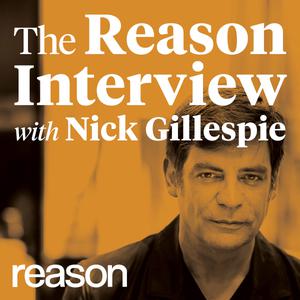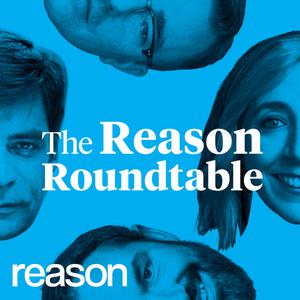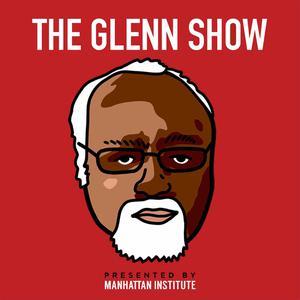
The Reason Interview With Nick Gillespie
The Reason Interview With Nick Gillespie
The leading libertarian magazine and covering news, politics, culture, and more with reporting and analysis.
- 56 minutes 59 secondsAlex Nowrasteh and Bryan Caplan: The Case for More Immigration
One of the very first things that Donald Trump did after being sworn in as president was to make good on promises to reduce both legal and illegal immigration. He even issued an executive order ending birthright citizenship, a right guaranteed by the Constitution's 14th Amendment. That order has already been blocked by a federal judge, and its fate may well end up being decided by the Supreme Court. But calls for less immigration are super popular, with 55 percent of Americans saying current levels should be decreased, the highest since 2001. Reason's Nick Gillespie disagrees with that—he believes that immigration is a good thing and that we should have more of it, done in an orderly, peaceful, efficient fashion.
So on January 21, the day after Trump's inauguration, Gillespie asked George Mason University economist Bryan Caplan and Cato Institute analyst Alex Nowrasteh to make the libertarian case for more immigration at a live event in New York City. They've written extensively on the topic and answer every question and concern you might have about immigration. The goal here is to steel-man critics of immigration and explain why more newcomers are good for our culture, economy, and country.
To get information about Reason's events in New York City, including The Soho Forum Debates, sign up for our NYC Events newsletter.
1:55—Trump's "Day 1" promises and actions
6:13—Was there a migrant "invasion"?
7:35—What does "open borders" mean?
11:03—What's the real story of chaos on the border?
22:06—The case for more immigration
24:30—Immigrant welfare use
31:11—H-1B visa debate
38:11—The Laken Riley Act and immigrant crime
42:00—Cultural arguments for more immigration
45:47—Assimilation in America
52:29—How many immigrants could the U.S. take in?
53:53—The most worrisome anti-immigration policies proposed- Video Editor: Ian Keyser
The post Alex Nowrasteh and Bryan Caplan: The Case for More Immigration appeared first on Reason.com.
29 January 2025, 4:00 pm - 53 minutes 25 secondsMichael Shermer: Conspiracy Thinking, Wokeness, and the Future of Free Thought
"Even paranoids have real enemies," said the poet Delmore Schwartz, who was both clinically paranoid and definitely on to something, according to today's guest: Michael Shermer, the founder of Skeptic magazine, Substack superstar, and author of many best-selling books about rationalism, the evolution of morality, and pseudoscience.
He quotes Schwartz in his latest book, Conspiracy: Why the Rational Believe the Irrational, to drive home the point that big, world-changing secret plots happen all the time, but there are reliable ways for us to decide whether Lee Harvey Oswald acted alone, 9/11 was an inside job, or vaccines cause autism. For the record, Shermer says yes, no, and no on those counts.
Reason's Nick Gillespie talks with Shermer about whether conspiracy thinking is on the rise, whether it's coded left or right, how wokeness poisons science, and whether the reelection of Donald Trump means free thought is ascendant. This interview was recorded at a live event in New York City in January. Sign up for invites to and news about Reason's New York events here.
Previous appearances:
- "Michael Shermer: How Scientific American Got Woke," by Nick Gillespie
- "The Future of Science: Podcast," by Matt Welch
- "Michael Shermer on Why Even Scientists, Transhumanists, and Atheists Want To Believe in Heaven," by Nick Gillespie
- "Reason and Science Make Us Moral: Michael Shermer on The Moral Arc," by Zach Weissmueller
- "Michael Shermer: Evolutionary Economics and the Google Theory of Peace," by Dan Hayes
- Video Editor: Ian Keyser
The post Michael Shermer: Conspiracy Thinking, Wokeness, and the Future of Free Thought appeared first on Reason.com.
22 January 2025, 4:00 pm - 1 hour 26 minutesChristina Dent: The Evangelical Christian Fighting To End the Drug War
This week's guest is Christina Dent, whose organization, End It For Good, seeks to change the approach to addiction from a criminal justice issue to a health-centered one. But Dent is not your typical anti–drug war activist. She's an evangelical Christian who believes legalizing drugs is the conservative thing to do—a position she adopted after an encounter she had as a foster mom.
Reason's Billy Binion and Dent talked about her conservative religious upbringing, the surprising history of the war on drugs, how the current approach to substance abuse fuels crime, misconceptions about people struggling with addiction, and why prohibition is actually a progressive response. She has also offered to send a copy of her recent memoir, Curious, free of charge to anyone interested in learning more, which you can request at [email protected].
0:00—Introduction
4:45—The foster experience that changed Dent
11:43—What causes addiction?
16:55—Addiction and recovery are not one-size-fits-all.25:57—Drug criminalization is anti-Christian conservative values
33:14—Helping families struggling with addiction
41:34—Decriminalization efforts in the U.S.
46:52—The costs and tradeoffs of legalization
59:43—Is Dent conservative or Republican?
1:02:15—Dent's law enforcement outreach
1:17:26—Effective treatment is not cold turkey or zero-sum.- Video Editor: Ian Keyser
The post Christina Dent: The Evangelical Christian Fighting To End the Drug War appeared first on Reason.com.
15 January 2025, 4:00 pm - 1 hour 52 secondsDouglas Irwin: Why Trump's Tariff Plans Are Dangerous
"Tariff is the most beautiful word in the dictionary," says Donald Trump, who made many promises throughout the 2024 presidential race to raise the cost of imports from China, Mexico, and Canada—America's three biggest trading partners. But are Trump's tariffs a good idea or a terrible one? And is the era of free trade coming to a close?
That's the topic of today's Reason Interview. Reason's Nick Gillespie talks with Dartmouth economist Douglas Irwin, author of Trade Policy Disaster: Lessons from the 1930s and Free Trade under Fire, now in its fifth edition. They talk about the negative impacts of the tariffs that Trump levied in his first term; why Presidents George W. Bush, Barack Obama, and Joe Biden also trafficked in protectionism; and why free trade is always under attack despite its overall benefits.
0:00—Introduction
1:13—The fight for free trade
3:06—Donald Trump: "Tariff Man"
5:44—How tariffs affect consumers
9:03—Trump's political motivations behind tariffs
12:33—U.S. steel industry
15:15—The effect of protectionism on jobs
18:39—Automation, industry, and agriculture
25:40—China's protectionist policies
26:58—Smoot–Hawley Tariff Act
33:59—Free trade debates of the Ronald Regan, George H.W. Bush, and Bill Clinton eras
38:41—China's impact on markets
40:24—Populist arguments against free trade
44:49—The narrative about the baby formula shortage is wrong.
51:29—"Made in China" vs. "assembled in China"
52:41—The "Buy American" fallacyToday's sponsor:
The Reason Speakeasy. The Reason Speakeasy is a monthly, unscripted conversation in New York City with outspoken defenders of free thinking and heterodoxy that doubles as a taping of The Reason Interview With Nick Gillespie. The next one takes place on January 21 with two of the nation's most notable proponents of immigration liberalization, David Bier and Bryan Caplan, who will join Nick for a timely discussion about the state of U.S. immigration policy in 2025. They will discuss the implications of the incoming Trump administration's immigration proposals and make the libertarian case for why more immigration will make America great again.
- Video Editor: Ian Keyser
The post Douglas Irwin: Why Trump's Tariff Plans Are Dangerous appeared first on Reason.com.
8 January 2025, 4:00 pm - 1 hour 57 secondsHelen Prejean: Why This Nun Is Fighting To End the Death Penalty
Today's guest is Sister Helen Prejean, a Catholic nun famous for her activism against the death penalty. In the early 1980s, Prejean met a prisoner on death row—Elmo Patrick Sonnier—after an activist asked her to write him a letter. She served as Sonnier's spiritual adviser and accompanied him to his death, which inspired her work against capital punishment. Her 1993 book, Dead Man Walking, was made into a movie starring Sean Penn and Susan Sarandon, who won an Academy Award for her portrayal of Prejean. Jake Heggie and Terrence McNally also created a highly regarded opera of the same name.
Reason's Billy Binion spoke with Prejean about growing up in the segregated South, her opposition to the death penalty, how she connects with crime victims, and her response to Christians who believe the death penalty is just.
0:00—Introduction
1:15—Dead Man Walking and being a spiritual adviser
4:40—Sister Prejean's death row counseling
11:52—Robert Lee Willie and Faith Hathaway
18:45—Advocating for "unpopular" people
29:20—Marcellus Williams
33:09—Would Prejean support the death penalty even if absolute certainty was possible?
34:48—Faith-based activism and "loving your enemy"
40:07—Being truly "pro-life"
42:29—Navigating tribalism
44:29—Calling on the church to embrace feminism and LGBTQ inclusivity
47:07—Prejean's personal history and Vatican II reforms
51:40—Falling in love with a priest despite a vow of celibacy
56:42—The biggest threat in the world now- Video Editor: Ian Keyser
The post Helen Prejean: Why This Nun Is Fighting To End the Death Penalty appeared first on Reason.com.
1 January 2025, 4:00 pm - 1 hour 4 minutesJeffrey Edward Green: Why Bob Dylan's Prophecies Continue To Fascinate
Few figures have literally and figuratively electrified American culture the way Bob Dylan has. He released his first album in 1962, won a Nobel Prize in Literature in 2016, and continues to perform about 100 concerts a year at the ripe age of 83. His life is chronicled in the new movie A Complete Unknown, starring Timothée Chalamet.
But what's the meaning—or meanings—of Bob Dylan, who sang at Martin Luther King Jr.'s March on Washington, became a born-again Christian in the 1970s, and wrote a book called The Philosophy of Modern Song?
Reason's Nick Gillespie talks with Jeffrey Edward Green, a political scientist at the University of Pennsylvania and the author of the new book Bob Dylan: Prophet Without God. Green argues that Dylan's work embodies a uniquely American tension between commitments to individual self-expression, the pursuit of political and social justice, and being right with one's version of God. In this, he is akin to Ralph Waldo Emerson, Henry David Thoreau, and other figures who refused to subjugate their lives completely to a particular cause. Dylan's willingness to openly struggle with these conflicting demands—and his abiding interest in adapting past musical forms—helps explain why he remains so important to understanding where we've been as a country and where we might be headin'.
- Video Editor: Ian Keyser
The post Jeffrey Edward Green: Why Bob Dylan's Prophecies Continue To Fascinate appeared first on Reason.com.
25 December 2024, 3:30 pm - 49 minutes 38 secondsPenny Lane: Why I Gave a Kidney to a Total Stranger
Today's guest is Penny Lane, the acclaimed documentary filmmaker whose previous works include Listening to Kenny G and Hail Satan?, both of which formed the basis of previous Reason interviews linked in the show notes.
Her exceptional new film is Confessions of a Good Samaritan. It's currently streaming on Netflix and follows her experience as an "altruistic" kidney donor, or one who gives an organ away to an anonymous stranger. Reason's Nick Gillespie talks with Lane about how she came to make her decision; its effects on her body, mind, and finances; and the ethics of current policy, which prevents donors from being paid for giving away life-saving organs. "My instinct as more or less a libertarian is, yeah, pay people," Lane tells Reason. "It seems like a really obvious thing." But it's not a simple one, she explains, both because of current laws and medical history. They also talk about the state of documentary film making, if we're in a golden age for the genre, and whether audiences are becoming smarter consumers of media.
Previous appearances:
"Penny Lane: Can 75 Million Kenny G Fans Be Wrong?" December 1, 2021
"Hail Satan? A New Documentary Depicts Devil Worshipers as Unlikely Defenders of the First Amendment," April 26, 2019
00:00- Introduction
2:19- Penny Lane's altruistic kidney donation
4:21- Effective altruism's influence on Lane
6:12- Lane's obstacles before surgery
7:13- Recovering from surgery physically & psychologically
11:25- Parable of the Good Samaritan
15:43- Kidney donation policy
19:34- How financial incentives would change the equation
21:03- History of kidney transplants
24:17- Could man-made organ transplants be common soon?
28:49- 'Disgust' around selling organs
32:23- Starring in your own documentary
38:12- Are audiences more media literate now?
40:33- Lane's history with documentary filmmaking
41:46- Lane's documentarian heroes
48:06- Lane's current projects
- Video Editor: César Báez
- Audio Production: Ian Keyser
The post Penny Lane: Why I Gave a Kidney to a Total Stranger appeared first on Reason.com.
18 December 2024, 3:45 pm - 49 minutes 46 secondsErrol Morris and Jacob Soboroff: Trump's Immigration Policies Are Indefensible
In late 2017, in the name of "zero tolerance," President Donald Trump introduced a policy of separating parents and children who crossed the Southern border and requested asylum in the United States. In all, an estimated 5,500 children were taken from their parents and many were held in detention facilities, some of which had been constructed by the Obama administration. Over 1,000 children are still unaccounted for by the federal government. The policy ended in 2018 after massive public outcry. The zero tolerance policy is the subject of Separated, a new documentary by Academy Award–winning filmmaker Errol Morris. It has aired on MSNBC and will be available for streaming on December 17.
Reason's Nick Gillespie talks with Morris and journalist Jacob Soboroff, whose book on the controversy inspired the film. They discuss how family separation became policy and whether it acted as a deterrent, America's long and ambivalent relationship with legal and illegal immigration, and what Trump's second term will mean for immigration policy.
0:00- Introduction
2:15- Trump's 'zero-tolerance' immigration policy
5:33- Jacob Soboroff's book
9:33- Who was really behind the child separation policy?
13:09- State-created orphans and the asylum process
15:04- Immigration policies through U.S. history
18:31- American attitudes towards immigration v implemented policies
21:21- Ad: ZBiotics
23:07- Anti-immigration rhetoric escalated during the 2024 election
29:15- 'Border Czar' Tom Homan
32:15- Stephen Miller, Elaine Duke & Kirsten Nielsen
37:35- Nielsen's replacement, Kristi Noem
39:42- The Dunning-Kruger administration?
40:57- Expertise vs. disruption
44:43- How to change attitudes toward immigration
Previous appearances:
- "Errol Morris on Steve Bannon, Donald Trump, Theranos, and Cancel Culture," November 8, 2019
- "Errol Morris on Donald Rumsfeld, The Unknown Known, and Evidence-Based Journalism," April 12, 2014
Today's sponsor:
- ZBiotics. ZBiotics Pre-Alcohol Probiotic Drink is the world's first genetically engineered probiotic. It was invented by Ph.D. scientists to tackle rough mornings after drinking. Make ZBiotics your first drink of the night, drink responsibly, and you'll feel your best tomorrow. Get 15 percent off by going to ZBiotics/TRI and using the code TRI at checkout.
- Video Editor: Ian Keyser
The post Errol Morris and Jacob Soboroff: Trump's Immigration Policies Are Indefensible appeared first on Reason.com.
11 December 2024, 3:30 pm - 1 hour 7 minutesBrendan O'Neill: The West Went Insane After October 7
Reason's annual Webathon is underway. Please considering donating here.
Today's guest is Brendan O'Neill, chief political writer for Spiked and the author of the bracing new book, After the Pogrom: 7 October, Israel and the Crisis of Civilisation.
O'Neill and Reason's Nick Gillespie talk about the response in the United Kingdom and the United States to Hamas' attacks last year, Israel's ongoing military actions, and what's likely to come next in a postwoke world. "On October 7," says O'Neill, "the progressive left went from 'believe women' to 'believe fascists.' They took Hamas at its word over the testimonies of raped women."
They also discuss whether O'Neill's politics have changed over the years. At the start of his career a quarter-century ago, he was an unapologetic man of the left—a self-declared Trotskyist, in fact. But these days he seems to make more common cause with conservatives and libertarians. "My rallying cry remains the same," O'Neill insists. "Increase the power of man over nature and decrease the power of man over man."
0:00- Introduction
1:16- O'Neill's new book: "After The Pogrom"
5:48- Hamas is religious extremist movement
11:10- Islamism as extreme rejection of modernity
16:57- Is being anti-Zionist punk?
18:40- The 'cultural appropriation' of the Keffiyeh
21:17- Is Israel a white settler-colonialist state?
24:28- When did the left turn against Israel?
28:53- Is antisemitism connected to anti-capitalism?
32:30- The demonization of Israel
33:40- Palestine as the Omni-cause
35:34- The madness of Queers for Palestine
39:29- The catastrophe of post-Oct. 7 progressivism
43:34- Did Oct. 7 accelerate the collapse of wokeness?
46:40- How much should the west be supporting Israel's war effort?
51:28- O'Neill's political evolution
53:21- How gay liberation differed from the trans movement
58:22- Today's young activists seek institutional approval
1:00:50- How Marxism & Trotsky influenced O'Neill
1:04:14- Critics of Zionism in 1930s-40s Europe
Previous appearances:
"A Heretic's Manifesto: Spiked's leading polemicist defends J.K. Rowling, Brexit, and Enlightenment values of free speech and pluralism," June 21, 2023
- Video Editor: Ian Keyser
The post Brendan O'Neill: The West Went Insane After October 7 appeared first on Reason.com.
4 December 2024, 3:15 pm - 52 minutes 15 secondsMartin Gurri: Political Chaos Brings Colossal Transformation
Today's guest is Martin Gurri, a former CIA analyst who is a visiting fellow at the Mercatus Center and a columnist for The Free Press. A decade ago, in the wake of the Arab Spring and various "color" revolutions around the world, Gurri published The Revolt of the Public and the Crisis of Authority in the New Millennium, which analyzed how social media empowered ordinary people to resist control from above and anticipated the rise of Donald Trump, French President Emmanuel Macron, and Brexit.
Reason's Nick Gillespie spoke with Gurri shortly after the 2024 election at The Reason Speakeasy, a monthly, unscripted conversation in New York City with outspoken defenders of free thinking and heterodoxy in an age of intellectual conformity and groupthink. (Go here for information on Reason events.) They talked about why Gurri voted for Trump and why he's cautiously optimistic about the next four years.
0:00- Introduction
1:13- Why Gurri voted for Trump
4:46- Trump vs. Harris: Chaos vs. Control
8:40- Trump's first term 11:04- Trump's new coalition
14:33- Is authoritarianism coming to America?
19:00- Attention, Populism & Wild Hair
20:42- Colossal transformation awaits us
34:05- Creating communities of meaning in the digital age
36:22- The transformations enabled by the printing press
38:41- More chaos is coming 43:11- Lessons from Cuba
48:40- Arab Spring and the spark that overthrows a regime
50:37- Short term pessimistic, long term optimistic
Today's Sponsor:
- Reason Versus: "You Don't Have To Pick a Side in Politics": On Wednesday, December 18, you are invited to join Reason and our friends at The Bulwark for this new thought-provoking debate series in Washington D.C. at the Howard Theatre. Whether you've made up your mind about the necessity of choosing sides or are questioning the whole premise, this debate will challenge your assumptions and broaden your perspective.
- Video Editor: Ian Keyser
The post Martin Gurri: Political Chaos Brings Colossal Transformation appeared first on Reason.com.
27 November 2024, 4:35 pm - 1 hour 22 minutesAmanda Knox: 'I Have Felt Utterly Exploited' by True Crime
Today's guest is Amanda Knox, an activist, writer, and host of the podcast Labyrinths. In 2007, while studying abroad in Italy, Knox was accused of murdering her roommate, Meredith Kercher, in what the lead prosecutor claimed was a bizarre sex game gone wrong. Despite mishandled DNA, a coerced confession, and a lack of credible evidence, Knox was convicted and spent nearly four years in an Italian prison before being exonerated in 2015. Her case was a media spectacle that sensationalized every aspect of her life.
Reason's Billy Binion talks with Knox about her views on true crime after her story became one of the biggest examples of the modern era. They also discuss the psychological impact of being imprisoned for something she didn't do; what Knox thinks the U.S. criminal justice system gets right and wrong; and how she reacts to people who still believe she's lying. What's more, she shares a fascinating tidbit about her relationship with the lead prosecutor on her case—something that will be featured more in her new book Free, which is available for preorder.
0:00—Introduction
1:10—Coping with a wrongful conviction
6:29—Life in prison
15:28—Knox's coerced confession
19:52—Knox's second conviction and failed retrial
25:55—The attempt to find "normalcy"
31:45—"Foxy Knoxy" and the vicious press
34:40—The need for greater media literacy and transparency
39:54—'The Single Victim Fallacy' and grieving Meredith Kercher
49:19— Italian vs. American criminal justice systems
53:26—The criminal justice reform movement
55:27—Police deception should be banned
58:36—Unrepentant prosecutors and Sandra Hemme
1:04:13—Prosecutor of Knox's case and her new book Free
1:08:11—Knox's relationship to True Crime
1:18:05—Knox's podcast Labyrinths and skeptical approach- Video Editor: Ian Keyser
The post Amanda Knox: 'I Have Felt Utterly Exploited' by True Crime appeared first on Reason.com.
20 November 2024, 6:15 pm - More Episodes? Get the App
Your feedback is valuable to us. Should you encounter any bugs, glitches, lack of functionality or other problems, please email us on [email protected] or join Moon.FM Telegram Group where you can talk directly to the dev team who are happy to answer any queries.
 The Fifth Column
The Fifth Column
 The Reason Roundtable
The Reason Roundtable
 The Soho Forum Debates
The Soho Forum Debates
 Blocked and Reported
Blocked and Reported
 The Re-Education with Eli Lake
The Re-Education with Eli Lake
 The Glenn Show
The Glenn Show